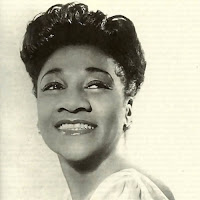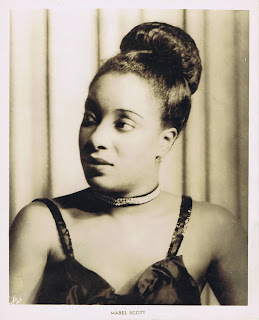Sophisticated Black Women and/or Tough Cookies
Another Bobsluckycat post presented by Mellow's Log Cabin!
This blog post is featuring 25 recordings and 25 small sketches of Sophisticated Black Ladies and/or Tough Cookies which will be fleshed out in a series of articles sans recordings in the Swedish music magazine "American Music" at a later date. "Separate But Equal" was the law of the land in the USA from civil war days until 1954 when it was struck down. Segregation however hasn't gone away, toned down maybe, but still here in various forms. Things have always been separate but never equal in the USA and in the music business in particular. These profiles are of recording artists who in ways both large and small broke through to wider audiences in America and world-wide as well. Some of these songs are quite well know and others rather obscure, but all were picked to show-case the recording artists and sometimes the menutia of the recordings selected. All were recorded between 1947 and 1980 or so for maximum sound quality. Enjoy these for the gems they are. Bobsluckycat
Jackie "Moms" Mabley born Loretta Mary Aiken in 1894 started out with a tragic childhood that included the deaths of both parents in horrific accidents and the birth of two children from rapes at a very young age and the loss of those children to the state. At 14, "Moms" ran away from home and joined a minstrel show as a comic. She traveled far and wide on the Black circuit playing clubs, theatres, and every other wide spot in the road that catered to Black folk, honing her persona of "Moms" Mabley over a 40 odd year period. She never had made a recording until November of 1949 with Pearl Bailey, when she made the attached. She was not known to white America. She had made a couple of film appearances through the years aimed at Black audiences. She, at some point, made the Apollo Theatre in New York City her "unoffical" home base and at times commanded a salary of $10,000.00 per week. She holds the record for most appearances there to this date. In 1960, a record producer took some of her tapes to Chess Records in Chicago, who sprung them on a wide white audience to great success and fame not known to her before. Mercury Records continued the series of comedy LPs into 1971. Nearly dying in 1973 from a heart attack while filming and starring in "Amazing Grace", "Moms" finished the film and saw it's release before she passed away in 1974, going out on top.
Alberta Hunter born in 1895, ran away from home at age 11 to Chicago, hoping to be a singer but took work for a dollar day in a rooming house in Chicago. Soon joined by her mother who became her manager, she was making $35.00 dollars a week singing with King Oliver's Band and touring to points in England and Europe in 1917 during World War I. Starting in 1920 and into the 1930's, Alberta recorded extensively for various recording companies in the USA and England. By 1928, Alberta was famous and appeared opposite Paul Robeson in the stage production of "Show Boat" in London. Moving her home base to London then, she played various venues in England and Europe as well as America until the outbreak of World War 2, when she again returned to a new base in New York City. She continued to be busy in the states and on Black USO tours throughout WW2 and Korea until the 1957 death of her mother. Taking 20 years out then to work as a nurse, retiring from that at 82, and took up a renewed singing career based in New York City at "The Cookery", recorded some albums for Columbia Records, toured far and wide including Europe and South America and played by invitation of the President at the White House, dying in 1984, never having ever retired.
Memphis Minnie was one tough cookie to be sure, born Lizzie "Kid" Douglas in Louisiana in 1897, raised mostly in Mississippi and ran away to Memphis at age 13 to sing on street corners off and on until the money ran out at times and then she returned home until the urge to entertain put her back on the streets of Memphis. Minnie was part of the Ringling Brothers Circus in the years from 1916 through the 1920 season and then back to Memphis' musical scene. From 1929 on for several mostly related recording companies until 1950, Minnie recorded extensively in the country blues vein and some of her recordings were just plain "white folks" country and had she not been Black, could have appeared on WSM's "Grand Ole Opry" and other such programs but didn't, couldn't or wouldn't. Take your pick. The 1952 recording, selected from the original master tape, is a cross between the old and new Blues styles being born of high fidelity and tape. Minnie could have mastered that but didn't. After a long stay in Chicago and points east and north, Minnie suffered some extensive strokes and finally passed away in 1973 in Memphis. Truly one of a kind.
Julia Lee born 1902 was a piano playing singer who joined her brother George Lee's band in and around Kansas City Missouri at the start of prohibition in 1920 and stayed with him into 1935. Female singers were relegated to doing risque and double-entendre songs and comical "coon" songs in those years. Julia Lee made them her stock in trade. She recorded for Capitol Records from 1944 into 1952 and had several which did not get airplay on white radio and not too much on Black radio, but several of her records jammed jukeboxes and sold a lot of records besides. The one selected was her last recording from 1952. Julia Lee was a local favorite in Kansas City until her untimely death from a heart attack in 1958 at age 56 just following a brief film appearance in an early Robert Altman film.
Nellie Lutcher born in 1912 in Lake Charles Louisiana to a musical family. Daddy played bass, Mama played organ in church and gave Nellie piano lessons, and brother was Joe Lutcher a noted saxophonist and big band and jazz band leader. In 1924, Nellie filled in for Ma Rainey's regular pianist, who was ill and couldn't make the date. She was 12. At 14, she joined her father in a travelling jazz band. By the mid 30's, Nellie had re-located to Los Angeles and giged around the area through World War 2. In 1947, she was signed to Capitol Records and recorded several hits through 1950 for that label. (editorial comment; I always thought that was strange. Capitol had Julia Lee already signed to the label as well as Nat "King" Cole's Trio and white artists working in the same type of music pretty much, Freddie Slack, Ella Mae Morse, and Merrill Moore . Separate but equal, again, I guess?) I would never have known of Ms. Lutcher but a local D.J. had known her from his WW2 days on the West Coast and he raved about her new recording which came out on Decca Records in 1955 and which he proceeded to played to death on the air locally to no avail. Nellie Lutcher continued to gig in the L.A. area for many years. Rich from property ownership, song copyrights and other income, she slowed things down by the becoming an officer with the local L.A. Musicians Union for several years as well. Retiring in the 1990's completely from performing, Nellie Lutcher died in 2007 of pneumonia at age 94.
Mabel Scott born in 1915 in Richmond Virginia and grew up in New York City singing Gospel music in church and by 1932 was a featured singer with Cab Calloway at the Cotton Club in Harlem. 1936 saw her playing in Cleveland and the surrounding area. Following that, Ms. Scott toured England and Europe until WW2 came along and forced her back to the USA. While in England she recorded some sides for Parlophone Records in England. Ending up on the west coast as a vocalist for The Jimmie Lunceford Orchestra for a while and then became a mainstay with Wynonie Harris at the Club Alabam in L.A. until the war ended. Post war Mabel Scott had early hits on Exclusive Records and then went with King Records, Coral and Brunswick subsidiaries of Decca Records and had no hits. The song I've selected is a R&B cover of Hank Penny's Country hit from 1951. Not happy with her career and personal life as well, Mabel Scott quit the business and returned to singing gospel music, passing away in 2000 in L.A.





1 comment:
This was great to read, thanks
Post a Comment